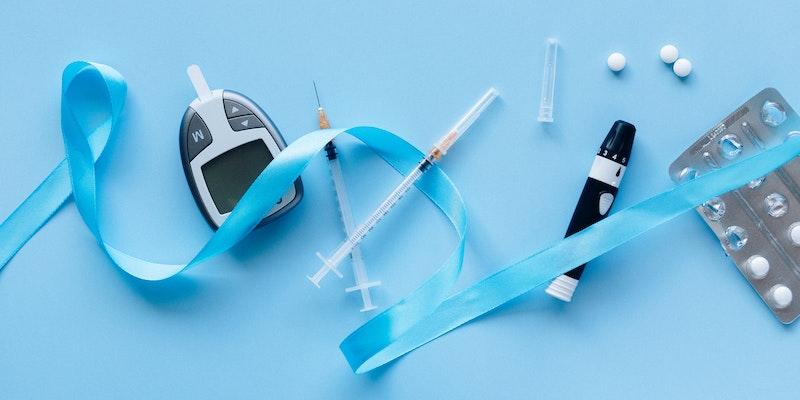Exploring the Complex Relationship Between Diabetes and Sleep Quality
Oct 11, 2023 By Nancy Miller
The mood and cognitive function of humans depends on their amount of sleep. People with diabetes often have trouble sleeping. Researchers and doctors worldwide sparked a committee and started in-depth research on the diabetes-sleep relationship. This article will discuss why diabetes affects sleep, including sleep apnea and diabetes type 2.
The Direct Influence of Blood Sugar Levels
In exploring the dynamics between diabetes and sleep, the regulatory role of blood sugar firmly situates itself at the core, subtly weaving a narrative that intertwines physiological processes with nocturnal restfulness. Elevated or fluctuating blood sugar levels stand out as notorious disruptors of serene slumber, unbridling a cascade of events that could stir individuals from the comforting arms of sleep.
High Blood Sugar (Hyperglycemia)
A surge in blood sugar levels sets the kidneys into an overdrive mode, accelerating their efforts to purge the body of excess sugar through increased urine output. This necessity to frequently evacuate the bladder throughout the nocturnal hours carves out a path of disrupted, unsatisfactory sleep. The entanglement of the need for urinary elimination and the pursuit of undisturbed sleep becomes a balancing act, a teetering dance between physiological demand and the desire for restful unconsciousness.
Low Blood Sugar (Hypoglycemia)
Hyperglycemia and hypoglycemia both disrupt sleep. Due to a drop-in blood sugar, hypoglycemia causes palpitations, trembling, and perspiration, which can wake someone up. Low blood sugar disrupts sleep, creating a paradox.
Sleep Apnea and Diabetes

Wading through the intricacies of sleep apnea and diabetes reveals a perplexing bi-directional relationship. Sleep apnea, characterized by periodic pauses in breathing during sleep, does not merely whisper inconveniences into the ear of tranquility; it shouts disturbances into the realm of glycemic control. The sporadic cessations in breathing jolt the body into a state of stress, surging stress hormones into the bloodstream and subsequently disrupting the harmony of sugar management.
Decoding the Role of Diabetes in Propagating Sleep Apnea:
When we dissect the involvement of diabetes, particularly sleep and diabetes type 2, in bolstering the risk of sleep apnea, the narrative brings forward obesity as a prominent, shared risk factor. Excess weight, especially in the upper body, generates a mechanical burden on the respiratory system, crafting an environment ripe for the manifestation of sleep apnea. Furthermore, the high sugar levels emblematic of diabetes contribute to a cascade of physiological changes, such as fluid retention, which can exacerbate obstructions in the airway during sleep.
Neuropathy and Discomfort
Neuropathy often casts a shadow over individuals grappling with diabetes, introducing unique challenges that notably influence sleep quality. This nerve damage results in a lingering discomfort, particularly in extremities like the hands and feet, turning a supposedly peaceful night into an ordeal of tossing and turning.
The sensations experienced by individuals with diabetic neuropathy vary but commonly include a tingling, burning, or painful feeling, especially noticeable during the nighttime. When the world quiets down and distractions fade, these sensations become more pronounced, acting as a persistent barrier between the individual and a restful night.
One cannot discuss neuropathy without mentioning its impact on diabetes and sleep, particularly how persistent pain and discomfort can disrupt the sleep cycle, diminishing sleep quality and quantity. The tumultuous relationship between poor sleep and elevated blood sugar levels forms a cyclical pattern, as insufficient sleep can also exacerbate diabetes management, showcasing a tangible link between sleep and diabetes type 2.
Moreover, when exploring the interaction between diabetes and sleep, the role of pain management for neuropathy becomes crucial. Pain management strategies often incorporate pharmaceutical and non-pharmaceutical interventions, ranging from medication to relaxation techniques, each with varying degrees of success in alleviating nocturnal discomfort and subsequently enhancing sleep quality.
Hormonal Changes and Sleep

Hormones serve as integral messengers within our bodies, orchestrating numerous physiological processes, including the delicate balance of sleep. Diabetes, with its pervasive influence over various bodily systems, inevitably intersects with hormonal regulation, introducing potential disruptions to rest through alterations in hormonal patterns.
Melanin
Melatonin, often dubbed the "sleep hormone," witnesses an impactful interference from diabetes, altering its secretion and impacting the circadian rhythms that dictate our sleep-wake cycles. Research indicates that individuals with diabetes may exhibit alterations in melatonin secretion, introducing potential hurdles in achieving consistent and restful sleep. This disruption lays down a path, forming a critical linkage between sleep and diabetes type 2, where irregular sleep patterns can further complicate diabetes management.
Cortisol
Cortisol, conversely, operates distinctly, elevating our alertness and energy. For individuals navigating the path between diabetes and sleep, cortisol, typically diminishing in the evening to pave the way for rest, can exhibit irregular patterns, potentially sustaining heightened levels into the night and thereby hindering sleep.
Restless Leg Syndrome (RLS) and Diabetes
You turn off the lights, pull up the covers, and hope for a restful night, yet your legs have a different plan. The irritating sensations start gradually: tingling, itching, an undeniable urge to move. This is a common scenario for those grappling with Restless Leg Syndrome (RLS), especially individuals managing diabetes. RLS doesn’t only shake the tranquility of your nights but may also signal deeper issues related to sleep and diabetes type 2. People experiencing RLS find their legs seem determined to move, even against their own will, denying them the rest they desperately need.
The combination of RLS and diabetes is unfair. Diseases like diabetes can damage leg nerves, causing RLS-like symptoms. RLS may impair sleep, which is essential for diabetes management. Long-term sleep deprivation, a common complaint among RLS patients, complicates diabetes and sleep management. To improve diabetes patients' lives, RLS and blood sugar control solutions must be explored.
The Vicious Cycle
Picture this: you barely blink through the night, tossing, turning, chasing the elusive arms of peaceful slumber, only to greet the morning with a weary body and an unrefreshed mind. The palpable connection between diabetes and sleep is not merely anecdotal but scientifically substantiated, unraveling a disheartening cycle that ensnares those trying to manage their diabetes effectively. This complex entanglement not only threatens to worsen diabetes control but also jeopardizes the individual's overall well-being, shedding light on the crucial nature of addressing sleep issues in diabetes care.
-
 Food Jan 19, 2024
Food Jan 19, 2024Best At-Home Food Sensitivity Tests
Suffering from food-related headaches, skin breakouts, and digestive issues? Read our review to find the best at-home food sensitivity tests to help you manage your dietary sensitivities.
-
 Food Nov 08, 2023
Food Nov 08, 2023Improve Your Mood: Foods that Increase Serotonin Levels
Explore how certain foods can increase your serotonin levels, providing essential support for mood regulation and overall mental well-being.
-
 Fitness Nov 21, 2023
Fitness Nov 21, 2023Optimal Stretches for Those Working in an Office
Office workers may boost their productivity with these stretches. This collection of desk-bound-relieving activities reduces stiffness.
-
 Food Nov 08, 2023
Food Nov 08, 2023Pecans Daily: Powerful Reasons to Incorporate This Nut into Your Diet
Explore the numerous health benefits of pecans, from heart health to digestion. Learn how to incorporate these nutritional powerhouses into your everyday meals.
